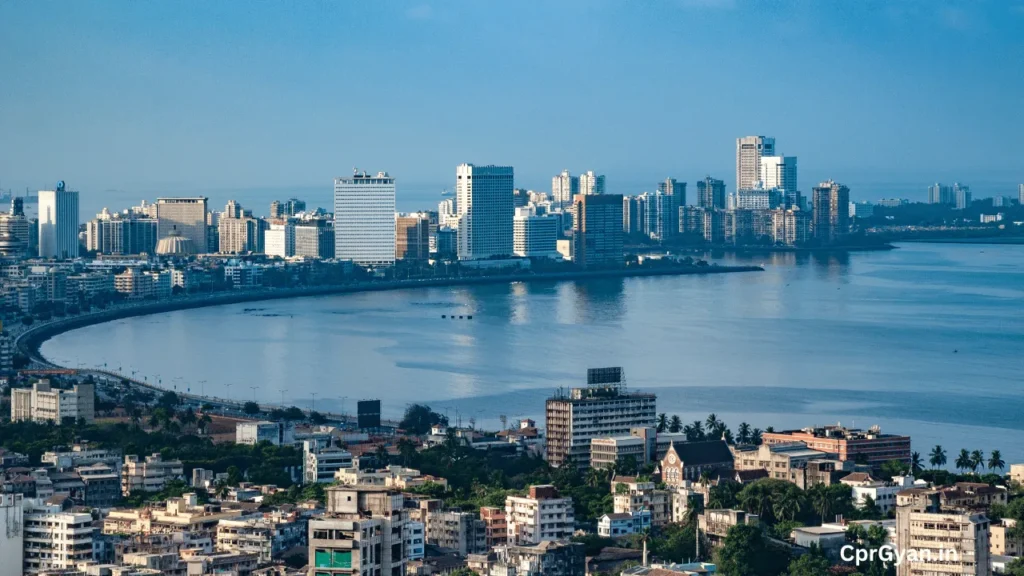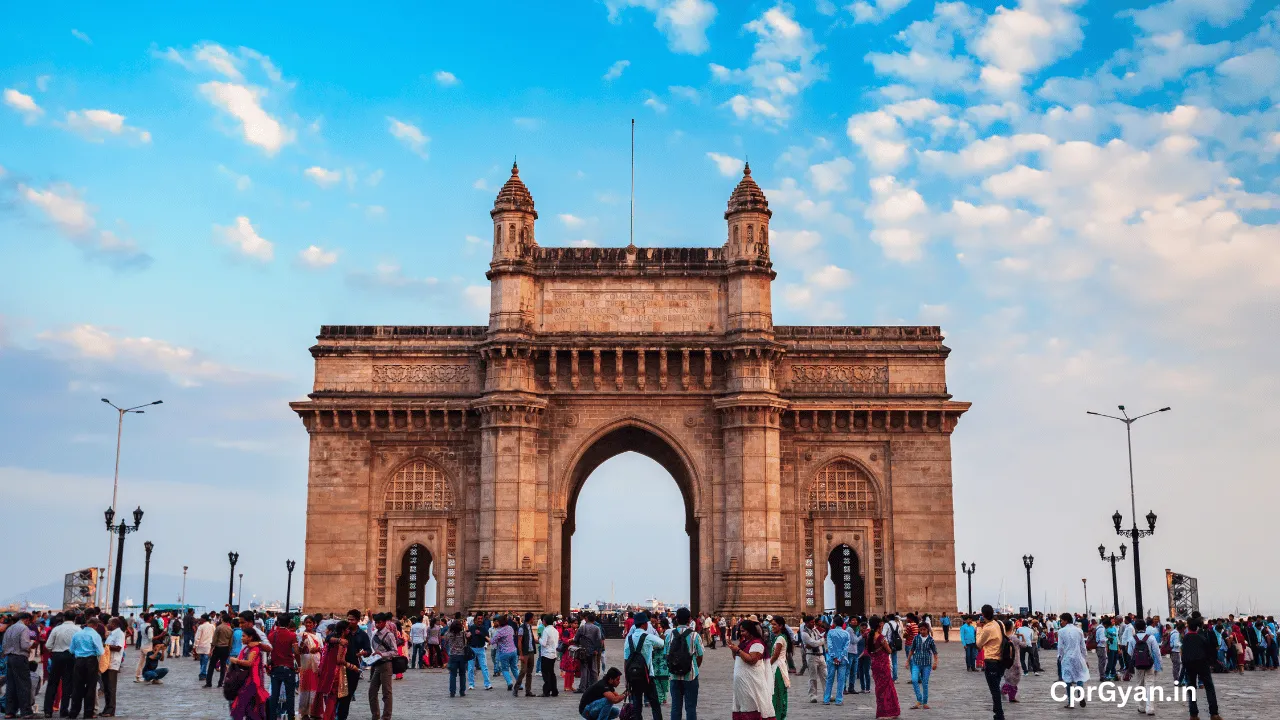Imagine a city that never sleeps, where dreams and finance meld into one electrifying fusion of opportunity. Welcome to Mumbai—the powerhouse, the linchpin, the game-changer of India’s economy.
But why should you, sitting miles away or perhaps continents apart, care about Mumbai’s title as the Financial Capital of India?
Whether you’re an aspiring entrepreneur, an investor eyeing the Indian market, or just someone intrigued by the marvels of global finance, Mumbai’s influence likely extends to your world in ways you’ve never considered.
Read on to discover the ten undeniable reasons why Mumbai isn’t just India’s financial nerve center—the beating heart sends ripples through the global economy.
Prepare to be fascinated because this city packs more than Bollywood glamor; it holds the keys to understanding India’s financial ascent on the world stage.
1. Historical Context – The Birth of a Financial Giant
When you walk through the bustling streets of Mumbai, filled with the aroma of street food and the din of local trains, it’s easy to forget that you’re treading on the ground that has been a hub of trade and commerce for centuries.
Once a collection of seven islands and fishing colonies, Mumbai (formerly known as Bombay) began its transformation into a financial powerhouse during the British colonial era.
Establishing the Bombay Stock Exchange in 1875 was a landmark event, laying the foundations for Mumbai’s economic ascendancy. What was once a place to exchange cotton has become one of the world’s busiest stock markets.
But it doesn’t end there; Mumbai was also chosen as the headquarters for the Reserve Bank of India when it was formed in 1935. This rich tapestry of history has imbued Mumbai with a legacy of financial robustness that’s hard to find elsewhere in India.
Also read: Eligibility to Invest in the Indian Share Market?
The city has continually adapted and grown, navigating through turbulent times—including global recessions and domestic challenges—while solidifying its reputation as the nation’s financial heart.
So, the next time you read a headline about a major business deal or a new economic policy in India, remember that Mumbai has been laying the groundwork for such milestones for decades, if not centuries. And that’s just scratching the surface.
2. The Stock Market and Exchanges – The Pillars of India’s Financial System
Imagine a place where billions of dollars change hands every day, where the rise and fall of numbers can either make dreams come true or bring empires to their knees. Welcome to the epicenter—the Bombay Stock Exchange (BSE) and the National Stock Exchange (NSE).
In Mumbai, these stock exchanges are not just trading floors but the pulse points of India’s economic ambitions. Established in 1875, BSE is Asia’s first and the world’s tenth-largest stock exchange, a venerable institution that has seen India’s economy evolve firsthand.
NSE, although younger, is no less significant; it ranks as the world’s eleventh-largest stock exchange and specializes in offering an electronic trading platform, making it a favorite among new-age investors.
Together, these exchanges make Mumbai the pivotal axis around which the wheels of India’s financial ecosystem rotate. They provide the liquidity and market depth that make India an attractive investment destination.
Also read: Top 20 Best Youtube Channels To Learn Stock Market in India
Everyone’s eyes are glued to the tickers running across the screens on Mumbai’s trading floors, from small retail traders to giant hedge funds. The numbers here don’t just indicate market trends; they reveal the mood of an entire nation.
So whether you’re an investor, a policy-maker, or simply a curious observer, understanding the role of Mumbai’s stock exchanges is crucial to grasping the complexities of India’s booming financial landscape.

3. The Banking Ecosystem – Mumbai’s Role as the Banking Epicenter
If Mumbai’s stock exchanges are the nation’s pulse, then its banks serve as the lifeblood, circulating capital, and resources that keep the Indian economy vibrant and agile.
Nestled in the city’s skyscraper-filled skyline, you’ll find the headquarters of the Reserve Bank of India (RBI)—the country’s central bank and the custodian of its foreign reserves.
Acting as a regulator and policy-maker, the RBI’s decisions reverberate across every home, business, and government office in India. But the city’s banking influence doesn’t end with the RBI.
Mumbai is home to numerous public and private sector banks, financial services companies, and international banking institutions, each adding a layer of complexity and capability to India’s economic framework.
Here, colossal deals are inked, mergers are contemplated, and foreign investments are channeled, making Mumbai the linchpin for all significant banking activities in the country.
Also read: Top 11 Highest Return Stocks last 20 Years India
When a loan is sanctioned in Delhi or an investment is made in Bangalore, you can bet that the strategy and authorization likely flowed through the veins of Mumbai’s banking sector.
Understanding this city’s role in banking gives you a comprehensive view of why Mumbai isn’t just another metropolis; the financial command center dictates the flow of money throughout India.
So, whether you’re looking to start a business, invest in India, or understand the dynamics of this emerging economic superpower, remember—following the money trail will invariably lead you to Mumbai.
4. The Port City Advantage – Mumbai Ports and Maritime Trade
Imagine the cool sea breeze blowing through your hair as you stand overlooking the Arabian Sea. You’re also looking at one of the secrets behind Mumbai’s financial prowess—its strategic location as a port city.
Mumbai isn’t just a city; it’s a gateway that connects India to the world. Its ports, primarily the Mumbai Port and Nhava Sheva (Jawaharlal Nehru Port), are among the busiest in India, handling a massive share of the country’s import and export activities.
But what does maritime trade have to do with finance, you ask? Well, everything. These ports are the entry and exit points for goods, raw materials, and capital, facilitating trade and foreign investments.
In an era of globalization, this port advantage amplifies Mumbai’s role in global commerce, acting as a conduit for economic activities that have a ripple effect across various industries—from manufacturing and retail to real estate and services.
Even the taxes and revenues generated from these ports contribute significantly to the national exchequer, reinforcing the city’s role as a financial pillar.
So the next time you see ‘Made in India’ on a product label or read about India’s burgeoning export numbers, know that Mumbai’s ports have played a pivotal role in making that possible.
This maritime edge is just another feather in Mumbai’s densely-plumed financial cap, and it’s an essential piece of the puzzle for anyone keen on understanding India’s economic landscape.

5. Real Estate and Infrastructure – Sky-High Potential
Suppose Mumbai’s financial markets and banks are the heart and blood of India’s economy. In that case, its real estate and infrastructure are the skeletal framework that gives the city its shape and stature.
A casual glance at Mumbai’s skyline—dotted with towering skyscrapers and luxury apartments—reveals more than just architectural marvels; it uncovers a city where the cost per square foot can rival global cities like New York and London.
Why? Because owning real estate in Mumbai is not just a status symbol but an intelligent investment, reflecting the city’s economic vibrancy. Developers, multinational companies, and international investors are all vying for a piece of Mumbai’s land, making it a hotbed of real estate activity.
The city is also a hub for ambitious infrastructure projects, from the Mumbai Metro to the upcoming Coastal Road, which improves connectivity and significantly elevates property values.
The continuous influx of capital into real estate and infrastructure doesn’t merely add aesthetic appeal; it creates jobs, boosts ancillary industries like construction and hospitality, and attracts foreign investment.
In a way, the skyscrapers of Mumbai are not just made of steel and glass; they are built on a foundation of financial opportunities. If you’re looking to gauge the economic vitality of India, the towering skyline of Mumbai provides a vertical measure that’s hard to ignore.
It’s a physical manifestation of wealth, growth, and boundless possibilities, solidifying Mumbai’s position as the undeniable financial capital of India.
6. Business Hubs and Industrialists – Nariman Point to Bandra-Kurla Complex
If you’ve ever wondered where decisions that shape India’s economic future are made, look no further than Mumbai’s bustling business districts—Nariman Point, Bandra-Kurla Complex (BKC), and Lower Parel, to name a few.
These are not just clusters of impressive buildings; they are the nerve centers where billion-dollar deals are struck, startups find their angel investors, and industrialists sketch the roadmap for India’s economic journey.
Once the uncontested core of corporate activity, Nariman Point has seen companies from various sectors set up their headquarters here. Fast forward to the present, and the gleaming glass facades of the Bandra-Kurla Complex now house not just Indian conglomerates but also international corporations eager to tap into the Indian market.
It’s also only possible to talk about Mumbai’s financial clout by mentioning the industrialists and business tycoons who call this city home. From the Ambanis and the Tatas to new-age entrepreneurs, these individuals are influential in India and have made their mark on global business landscapes.
They invest in innovation, set industry trends, and influence policy changes at both national and international levels. In Mumbai, business is not just about profit and loss statements; it’s about shaping the future of a nation ready to claim its place on the world stage.
This unparalleled business acumen and capital concentration make Mumbai a magnet for anyone with a vision and the courage to see it through.
So whether you’re an entrepreneur in the making, an investor, or a business student, understanding the role of Mumbai’s business hubs and their key players is like having a backstage pass to India’s most exclusive financial theater.
7. Talent Pool – Educational Institutions and Skilled Workforce
Have you ever wondered what fuels the complex machinery of Mumbai’s financial sector? It’s the city’s extraordinary talent pool. Mumbai is a magnet for the brightest minds in India, attracting a range of professionals—from financial analysts and investment bankers to tech innovators and startup visionaries.
But this isn’t just a random influx of talent; it’s carefully cultivated through an ecosystem of prestigious educational institutions. The city is home to top-ranking business schools, engineering colleges, and universities that act as incubators for the next generation of leaders and thinkers.
But it’s not just the formal education that sets Mumbai’s workforce apart; the city’s inherent culture of hustle and ambition that molds its people.
When these highly skilled individuals enter the workforce, they bring a unique blend of technical know-how and an unquenchable thirst for success, making Mumbai the go-to place for companies seeking to hire the best.
This abundant reservoir of human capital feeds into the financial sector, ensuring that the city stays ahead—whether adopting the latest fintech solutions or developing innovative financial products.
The magic of Mumbai lies in its ability to offer a melting pot of diverse talents, contributing not just to its growth but also to influencing financial trends and policies on a national level.
Anyone looking to understand what drives India’s financial heart must recognize the city’s most valuable asset—its people. Mumbai’s talent pool isn’t just filling vacancies; it’s shaping the future of finance in India, one brilliant mind at a time.
8. Technology and Innovation – The Silicon Valley of India?
If you thought Silicon Valley had a monopoly on tech innovation, it’s time to set your sights on Mumbai. No longer just the traditional capital of banking and commerce, Mumbai is fast becoming a crucible for technology and innovation, especially in the financial sector.
From the rise of fintech startups disrupting traditional banking to blockchain technologies aiming to make economic systems more transparent and efficient, Mumbai is at the forefront of the tech revolution, transforming India’s financial landscape.
Nestled among the city’s skyscrapers and historic landmarks are state-of-the-art tech parks and innovation hubs, where the brightest minds collaborate to solve complex financial challenges.
Mumbai’s conducive ecosystem—capital access, mentorship, and a culture that celebrates innovation—makes it a natural nursery for tech-driven financial solutions.
Have you ever used a mobile payment app to split the bill at dinner or invested in the stock market with a tap on your smartphone? Chances are that the technology powering these conveniences was either developed or significantly influenced by companies based in Mumbai.
In an age where data is as valuable as gold, Mumbai’s commitment to leveraging technology ensures that it remains ahead of the curve, setting trends rather than following them.
This isn’t just good news for tech enthusiasts or financial professionals; it’s a beacon of progress that promises everyone a more efficient, transparent, and inclusive financial future.
So, the next time you marvel at the ease of digital transactions or the capabilities of AI in financial planning, remember that the roots of these innovations are deeply embedded in the fertile ground of Mumbai’s technological landscape.
9. Connectivity and Accessibility – Where All Roads Lead
Imagine a city so intricately woven with roads, railways, and air routes that it acts like a colossal spiderweb, connecting every nook and cranny within its limits and extending its reach far beyond.
That’s Mumbai for you—a city designed for connectivity. Accessibility is more than just a convenience here; it’s the lifeblood that keeps the city’s financial wheel turning daily.
From the pulsating local trains that ferry millions daily to the extensive network of highways and expressways, Mumbai’s transport infrastructure is a marvel of efficiency and planning.
But it’s about more than just getting from Point A to Point B within the city. Mumbai serves as an international gateway with the Chhatrapati Shivaji International Airport, one of the busiest airports in Asia, linking India to major financial hubs worldwide.
Whether a cargo shipment departing for New York or a business executive flying in from Tokyo, Mumbai is the starting point for countless journeys that drive economic activities both within and outside India.
Connectivity is an indispensable part of trade, finance, and business. And in Mumbai, this isn’t limited to physical travel; the city also boasts excellent digital infrastructure.
With high-speed internet and advanced telecom networks, financial transactions and business negotiations often happen at the click of a button or the speed of a text message. Mumbai’s superb connectivity ensures that a second is well-spent in a world where time is money.
Suppose you’re a business looking to set up shop in India or an investor looking for seamless operations. In that case, the connectivity that Mumbai offers makes it not just an option but an ideal destination.
10. Cultural Influence and Lifestyle – The Soul of the Financial Capital
What does culture have to do with finance? The answer lies in the bustling streets of Mumbai, where finance isn’t just a sector; it’s a lifestyle influenced by a rich tapestry of cultures, traditions, and a modern cosmopolitan ethos.
From high-powered business lunches in swanky South Bombay restaurants to street food vendors outside stock exchange buildings, the city offers a cultural kaleidoscope that directly and indirectly influences the world of finance.
Mumbai is a city that never sleeps, and this ceaseless energy extends into its financial life. Markets may close, but the conversations, negotiations, and networking go on, often in cultural settings like art galleries, theaters, or even cricket stadiums.
The blend of traditional values with a forward-thinking mindset creates a unique work ethic, fostering a community where deals can be as quickly made over a cup of chai as through a formal board meeting.
The city is also the birthplace of Bollywood, and the glamour and glitz often intertwine with finance, giving rise to unique investment avenues and financial opportunities linked to the entertainment industry.
In Mumbai, life and finance are not separate entities but intertwined threads that create the vibrant fabric of the city. It’s where you can find a yoga guru discussing portfolio investments, and a stock market trader engrossed in a classical music concert.
The cultural richness adds depth to the financial scene, making it more accessible, relatable, and humane. For anyone looking to truly grasp the essence of why Mumbai is the financial capital of India, understanding its cultural influence is not just an option; it’s a necessity.
After all, it’s not just the economics that makes a financial capital—it’s the people, the traditions, and the way of life.
11. The Global Reach – Mumbai’s Financial Footprint on the World Stage
If you thought Mumbai’s influence was confined to the geographical borders of India, it’s time to think again. This isn’t just a city; it’s a global financial powerhouse with a reach that extends to every corner of the world.
Whether it’s the New York Stock Exchange feeling the ripples of a significant deal struck in Mumbai or a small European investor keen on putting money into the Indian market, Mumbai is an indispensable player in the global financial theater.
But how does a city on the western coast of India become a linchpin in international finance? The answer lies in its diverse portfolio of financial activities that align with global markets, from foreign exchange services to international banking and trade finance.
Many of the world’s leading financial institutions have their Indian headquarters in Mumbai, and the city is a preferred destination for global summits, trade talks, and international economic events.
Mumbai doesn’t just follow global financial trends; it sets them. The city has its finger on the pulse of international finance and is always ready to adapt, innovate, and lead.
Understanding Mumbai is akin to having a comprehensive overview of emerging markets and investment opportunities in Asia and beyond for global investors.
In an increasingly interconnected world, Mumbai is a critical node in the complex web of global finance, linking India’s burgeoning economic prospects with international ambitions.
Suppose you’re a global citizen keen on decoding the complexities of worldwide financial systems. In that case, ignoring Mumbai’s role is like reading a book with a missing chapter—a chapter vital for understanding global finance’s narrative in the 21st century.
Conclusion:
As we’ve journeyed through these 11 pillars that make Mumbai the undisputed financial capital of India, it’s crucial to acknowledge that the city’s true essence cannot be entirely encapsulated in data points, graphs, or even awe-inspiring skyscrapers.
Mumbai’s financial prowess is also shaped by intangibles like ambition, resilience, and a ceaseless drive for innovation—qualities that you’ll find ingrained in its people, its culture, and even its landscape.
But here’s some food for thought: what if Mumbai, with its financial brilliance, serves as a mirror reflecting India’s broader aspirations? It’s a microcosm capturing the country’s hunger for progress, openness to global partnerships, and untiring spirit to outdo its achievements.
As the city continues to shape and reshape its financial narratives, it inadvertently sets a benchmark for what India could be—a nation not limited by its past but invigorated by its future possibilities.
So, the next time you find yourself lost in the dizzying numbers of the Sensex, the dazzling skyline, or the maze-like business districts, remember that you’re witnessing fragments of a much larger, fascinating story.
Mumbai isn’t just the financial capital of India; it’s a living, breathing testament to what can happen when human potential meets opportunity—where every day is a gamble, every risk a stepping stone, and every success a collective win not just for a city but for an entire nation.
And that, dear reader, makes Mumbai not just the financial capital but the pulsating heart of a nation ready to claim its place in a world without borders or ceilings.
FAQs
Why is the stock market so significant in making Mumbai the financial capital?
The Bombay Stock Exchange (BSE) and the National Stock Exchange (NSE), based in Mumbai, are among the world’s largest and most influential stock exchanges. They not only contribute to market capitalization but also set the financial mood of the country. The stock market’s role as a barometer of economic health is pivotal, and its location in Mumbai adds significant weight to the city’s claim as India’s financial capital.
How does Mumbai’s talent pool differ from other cities?
Mumbai attracts diverse professionals from various sectors, especially finance and technology. Its educational institutions are among the country’s best, acting as incubators for future leaders in these fields. Additionally, the city’s culture of ambition and hustle makes it a magnet for young graduates and experienced professionals looking for growth opportunities.
Is Mumbai’s influence only limited to finance?
While this blog focuses on the financial aspects, Mumbai is also a cultural, entertainment, and technological hub. Its influence extends beyond finance to sectors like Bollywood, fashion, and information technology, making it a multi-faceted metropolis with a far-reaching impact on various aspects of Indian life.
How does Mumbai’s port contribute to its financial status?
Mumbai’s strategic location along the Arabian Sea gives it a natural advantage as a port city. The Mumbai Port and Jawaharlal Nehru Port (Nhava Sheva) are among the busiest ports in India and handle a significant portion of the country’s cargo. This facilitates international trade and commerce, adding another feather to Mumbai’s financial cap.
How is Mumbai keeping up with technological advancements in finance?
Mumbai is at the forefront of fintech innovation, housing numerous startups and tech parks dedicated to financial technologies. The city’s businesses and financial institutions quickly adapt to technological advancements, making it a hotbed for fintech activities and keeping it relevant in an age of digital transformation.




